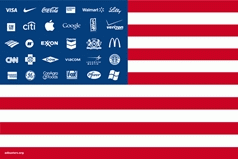The film "Unequal Justice" debuted in DC Tuesday evening at
the SEIU building, sponsored by the Alliance for Justice (AFJ) and The Raben
Group.
The [nonpartisan]
Raben Group, in its own words, offers "a tailored suite of services including
policy development, direct lobbying, coalition building, grass-tops campaigns,
political counsel and strategic communications." The more than one hundred
organizations that comprise the AFJ "work . . . to ensure that the federal
judiciary advances core constitutional values, preserves human rights, and
provides unfettered access to the courts for all Americans."
Surrounded by
words from AFJ founder and president Nan Aron and then a four-person panel
including moderator Linda Lipsen; consumer protection attorney Pam Gilbert;
Erica Smiley, director of Campaigns for Jobs with Justice; and SEIU general counsel Judy Scott, the film brings
to life three crucial US Supreme Court decisions that skewered the ideals of
democracy.
The strong and
unforgettable anecdotes, along with ascertainable facts, are food for the
action that must follow, said Gilbert after the film. The first anecdote, told
by Aron before the movie, concerned an appearance by Justice Samuel Alito at a
fundraiser organized by conservative lawyers. Like a Tea Party adherent, Alito
shouted out gun rights and his opposition to "entitlement" programs including
Medicare and Social Security.
"Their agenda is
big business and corporations," she said, referring back to the infamous Powell
Memorandum, a secret document leaked to renowned journalist Jack Anderson in
1971 that laid out an agenda for taking back the conservative American dream
from the late sixties left wing. And it has worked so well that we the people,
the 99 percent, are in far worse economic straits than Powell's people ever
were in the sixties. And cultural. And educational. The list goes on.
But not dumbed
down enough to elect Mitt Romney to the presidency. Not even close. The
ruggedly handsome Marlboro Man has seemingly been disappeared to the George W.
Bush dimension.
The point of the
film is that SCOTUS must be held accountable for its actions, Aron concluded.
Narrated by The Nation's editor and publisher
Katrina van den Heuvel, the film first portrays a vehement protest by female
Walmart employees over the unequal pay they receive compared with their male
coworkers, who are always first in line for promotions while merit and ability
take a back seat. Former Senator Russ Feingold and present Senator John McCain,
authors of the campaign finance legislation that kept presidential candidates
as honest as possible, next appear to comment on the disastrous Citizens United v FEC ruling, which
McCain calls the worst SCOTUS decision in the twenty-first century. According
to Feingold, Citizen United's harvest
will exceed the excesses of the Guilded Age.
The Roberts Court
is unconcerned with ordinary people, habitually ruling in favor of corporations,
van den Heuvel adds, following up briefly with a profile of the pioneer
conservative Lewis Powell, a Chamber of Commerce operative who was appointed by
Nixon to SCOTUS two months after publishing the memorandum.
Then the catalyst
of the heated demonstration that began the film takes center stage, the SCOTUS
predictable pro-corporate ruling on Walmart
v Dukes, a class-action suit brought by 1.5 million female employees of
Walmart all over the world protesting their treatment by the third-largest
employer in the world (exceeded only by the US government and then the Chinese
military).
One employee said
that her male coworkers earn twice what women do, and their complaints are
dismissed because men have families to support. But so do the women.
One anecdote
related later concerned a woman too intimidated to ask for time off when she
began to experience what turned out to be the first warning signs of ovarian
cancer. When she finally got to a doctor, the disease had progressed too far
and she lost her life soon after.
And how could so
many women from so many different store locations have the same complaint? was
one sage question the Court asked. Walmart was too big to sue. Instead, the
plaintiffs were told to press their charges in smaller groups or even
individually.
In the case of Cleveland v Messing, innocent young
lives were ruined by an anti-acne medication. One teenager suffered repeated
surgery over five years, during which her entire large intestine was removed,
among other agony and pain she suffered. In this case, because the culprit drug
was generic, the manufacturer was ruled not responsible. Although 80 percent of
the marketplace buys generic drugs, said Lipsen later, manufacturers are not
even required to put warnings on their labels. Had the company been a name
brand, it would have been impugned. The decision involved the usual
conservative-liberal ratio of five cold hearts versus four anguished
sympathizers.
Then, of course,
Citizens United became the focus--it
centered not on the McCain-Feingold legislation and the progression of campaign
finance laws that had led up to it for decades, but rather on a derogatory film
made about Hillary Clinton, then a presidential candidate. The plaintiffs
questioned whether the filmmakers had the right to screen the film, especially
so close to Election 2008.
In response, even
though Citizens United was such a small operation, the SCOTUS decision,
applying First Amendment rights to corporations as if each were an individual
citizen, lifted the cap on how much money could be spent on campaign
advertising. Justice John Paul Stevens, who delivered the dissenting opinion,
called the decision "a kick in the teeth of democracy."
(Note: You can view every article as one long page if you sign up as an Advocate Member, or higher).






